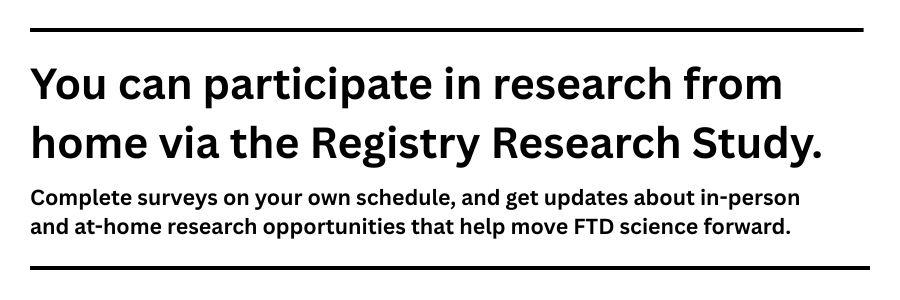PRESS & NEWS
How Caregiver Burden Affects Research Participation

Caring for a loved one with FTD can make research participation feel impossible. Learn more about the barriers caregivers face and how researchers can make studies more accessible.
Caring for a loved one with frontotemporal degeneration (FTD) can be an all-consuming role. Family caregivers often juggle medical appointments, personal care, behavioral changes, and financial stress while managing their own emotional health. These responsibilities can make participation in research feel out of reach, even for those who are deeply committed to advancing science.
Understanding how caregiver burden affects research participation is crucial for researchers, advocacy groups, and sponsors who are working to design inclusive studies. If we want to capture the full picture of life with FTD, we need to make sure that the voices of care partners are included.
What Is Caregiver Burden?
Caregiver burden describes the physical, emotional, social, and financial strain that comes with providing long-term care. In FTD, this burden is often amplified by:
- Early and rapid changes in personality, language, and behavior
- Long diagnostic journeys requiring multiple appointments and specialists
- Limited support services especially for younger families
- Financial challenges including lost income and increased expenses
For many caregivers, just getting through the day can feel like an accomplishment.
Barriers to Research Participation
When caregiver burden is high, even short surveys or one-time study visits can feel overwhelming. Common barriers include:
- Time constraints: Appointments, work, and family care leave little room for research activities
- Logistical challenges: Traveling to a study site can be physically and financially demanding
- Emotional readiness: Sharing experiences can be painful, especially during times of crisis
- Technology gaps: Not every caregiver is comfortable with online tools used in research
Why It Matters
When caregivers are unable to participate, researchers risk missing vital insights into the full impact of FTD. Care partners are often the most reliable reporters of symptoms, progression, and care needs. Without their input, data may be incomplete, which can slow progress toward better diagnostics, treatments, and supports.
Making Research More Caregiver-Friendly
Not all research can be done from home. Some studies require in-person assessments, biospecimen collection, or imaging. However, there are ways to reduce barriers and make participation more practical:
- Offer flexible participation options whenever possible, including online surveys or phone interviews
- Keep study visits efficient and provide clear schedules so caregivers can plan ahead
- Provide compensation or stipends to offset costs such as travel, respite care, or lost wages
- Communicate clearly about what participation involves and how the data will be used
- Close the loop by sharing study outcomes and showing caregivers the impact of their contribution
The FTD Disorders Registry was designed with these principles in mind. You can participate in research from home by enrolling in the Registry’s Research Study and completing surveys when it is convenient for you. By joining, you are also kept informed of upcoming studies, including those that require in-person visits, so you can choose which opportunities work for your family.
The Bottom Line
Reducing caregiver burden is not only an act of compassion, it is essential for research progress. By understanding and addressing the challenges caregivers face, we can make studies more inclusive, generate richer data, and ultimately speed progress toward treatments and a cure.
If you are a caregiver, your experience matters. Join the FTD Disorders Registry today to participate from home and receive information about future research opportunities that could benefit families like yours.
Together we can find a cure for ftd
The FTD Disorders Registry is a powerful tool in the movement to create therapies and find a cure. Together we can help change the course of the disease and put an end to FTD.
Your privacy is important! We promise to protect it. We will not share your contact information.




